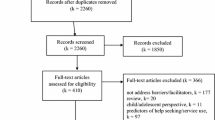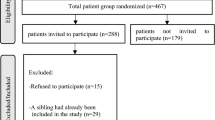Abstract
How parents give meaning to the problems of adolescents diagnosed with mental disorders and receiving treatment is likely related to important outcomes including parental well-being and commitment to treatment, as well as their own behaviors and reactions to their child. The aim of this cross-sectional, mixed-method study of 70 parents of adolescents receiving wraparound mental health services is to examine: (1) how parents conceptualize their child’s MH problems; (2) factors related to parents’ conceptualization of youths’ problems using medical model terms; and (3) associations between parents’ problem conceptualization and their emotional or coping responses to their child having psychiatric problem(s). Content analysis indicated that 54.3% of parents definitively conceptualized adolescents’ problems using psychiatric terms, 37.1% reported uncertainty about the nature of their child’s problems, and 8.6% gave alternative, non-psychiatric explanations for their child’s problems. We found significant relationships between parents’ problem conceptualization and their attitudes and experience with MH treatment, demographics, as well as with adolescents’ clinical characteristics. Parents who conceptualized problems using psychiatric terminology were more likely to express sadness and pessimism relative to other parents, though there were no differences in expressions of worry, guilt, pragmatism and optimism by problem conceptualization.
Similar content being viewed by others
References
Alegria, M., Canino, G., Lai, S., Ramirez, R. R., Chavez, L., Rusch, D., et al. (2004). Understanding caregivers’ help-seeking for Latino children’s mental health care use. Medical Care, 42(5), 447–455.
Aneshensel, C. S. (1999). Mental illness as a career: Sociological perspectives. In C. S. Aneshensel & J. C. Phelan (Eds.), Handbook of sociology of mental health (pp. 585–603). Dordrecht, The Netherlands: Kluwer.
Angold, A., Messer, S. C., Stangl, D., Farmer, E. M. Z., Costello, E. J., & Burns, B. J. (1998). Perceived parental burden and service use for child and adolescent psychiatric disorders. American Journal of Public Health, 88(1), 75–80.
Arcia, E., & Fernandez, M. C. (2003). From awareness to acknowledgment: The development of concern among Latina mothers of children with disruptive behaviors. Journal of Attention Disorders, 6(4), 163–175.
Bland, R., & Darlington, Y. (2002). The nature and sources of hope: Perspectives of family caregivers of people with serious mental illness. Perspectives in Psychiatric Care, 38(2), 61–68.
Breland-Noble, A. M. (2004). Black adolescents. Psychiatric Annals, 34(7), 535–538.
Brestan, E. V., Eyberg, S. M., Algina, J., Johnson, S. B., & Boggs, S. R. (2003). How annoying is it? Defining parental tolerance for child misbehavior. Child & Family Behavior Therapy, 25(2), 1–15.
Bussing, R., Gary, F. A., Mills, T. L., & Garvan, C. W. (2003). Parental explanatory models of ADHD: Gender and cultural variations. Social Psychiatry and Psychiatric Epidemiology, 38(10), 563–575.
Bussing, R., Koro-Ljungberg, M. E., Gary, F., Mason, D. M., & Garvan, C. W. (2005). Exploring help-seeking for ADHD symptoms: A mixed-methods approach. Harvard Review of Psychiatry, 13(2), 85–101.
Cauce, A. M., Domenech-Rodriguez, M., Paradise, M., Cochran, B. N., Shea, J. M., Srebnik, D., et al. (2002). Cultural and contextual influences in mental health help seeking: A focus on ethnic minority youth. Journal of Consulting and Clinical Psychology, 70(1), 44–55.
dosReis, S., Mychailyszyn, M. P., Myers, M., & Riley, A. W. (2007). Coming to terms with ADHD: How urban African-American families come to seek care for their children. Psychiatric Services, 58(5), 636–641.
Early, T. J., Gregoire, T. K., & McDonald, T. P. (2002). Child functioning and caregiver well-being in families of children with emotional disorders: A longitudinal analysis. Journal of Family Issues, 23(3), 374–391.
Forehand, R., & Kotchick, B. A. (1996). Cultural diversity: A wake-up call for parent training. Behavior Therapy, 27(2), 187–206.
Geffken, G. R., Keeley, M. L., Kellison, I., Storch, E. A., & Rodrigue, J. R. (2006). Parental adherence to child psychologists’ recommendations from psychological testing. Professional Psychology: Research and Practice, 37(5), 499–505.
Harden, J. (2005). ‘Uncharted waters’: The experience of parents of young people with mental health problems. Qualitative Health Research, 15(2), 207–223.
Hatfield, A. B., & Lefley, H. P. (1993). Surviving mental illness: Stress, coping, and adaptation. New York, NY: Guilford.
Hervey-Jumper, H., Douyon, K., Falcone, T., & Franco, K. N. (2008). Identifying, evaluating, diagnosing, and treating ADHD in minority youth. Journal of Attention Disorders, 11(5), 522–528.
Ho, J., Yeh, M., McCabe, K., & Hough, R. L. (2007). Parental cultural affiliation and youth mental health service use. Journal of Youth and Adolescence, 36(4), 529–542.
Hoagwood, K. E. (2005). Family-based services in children’s mental health: A research review and synthesis. Journal of Child Psychology and Psychiatry, 46(7), 690–713.
Hodges, K. (2000). Child and adolescent functional assessment scale. Ann Arbor, Michigan.
Karp, D. A. (1997). Speaking of sadness: Depression, disconnection, and the meanings of illness. New York, NY: Oxford University Press.
Karp, D. A. (2001). The burden of sympathy: How families cope with mental illness. New York, NY: Oxford University Press.
Karp, D. A., & Tanarugsachock, V. (2000). Mental illness, caregiving, and emotion management. Qualitative Health Research, 10(1), 6–25.
Kazdin, A. E., Holland, L., & Crowley, M. (1997). Family experience of barriers to treatment and premature termination from child therapy. Journal of Consulting and Clinical Psychology, 65(3), 453–463.
Kazdin, A. E., & Wassell, G. (2000). Predictors of barriers to treatment and therapeutic change in outpatient therapy for antisocial children and their families. Mental Health Services Research, 2(1), 27–40.
Kopiec, K., Finkelhor, D., & Wolak, J. (2004). Which juvenile crime victims get mental health treatment? Child Abuse and Neglect, 28(1), 45–59.
Lambert, M. C., Puig, M., Lyubansky, M., Rowan, G. T., & Winfrey, T. (2001). Adult perspectives on behavior and emotional problems in African American children. Journal of Black Psychology, 27(1), 64–85.
Leslie, L. K., Plemmons, D., Monn, A. R., & Palinkas, L. A. (2007). Investigating ADHD treatment trajectories: Listening to families’ stories about medication use. Journal of Developmental and Behavioral Pediatrics, 28(3), 179–188.
Logan, D. E., & King, C. A. (2001). Parental facilitation of adolescent mental health services utilization: A conceptual and empirical review. Clinical Psychology: Science and Practice, 8(3), 319–333.
Logan, D. E., & King, C. A. (2002). Parental identification of depression and mental health service use among depressed adolescents. Journal of the American Academy of Child & Adolescent Psychiatry, 41(3), 296–304.
Luby, J. L. (2007). Nosology of mood disorders in preschool children: State of knowledge and future directions. In W. E. Narrow, M. B. First, P. J. Sirovatka, & D. A. Regier (Eds.), Age and gender considerations in psychiatric diagnosis: A research agenda for DSM-V (pp. 191–200). Arlington, VA: American Psychiatric Publishing Inc.
McKay, M. M., & Bannon, W. M., Jr. (2004). Engaging families in child mental health services. Child and Adolescent Psychiatric Clinics of North America, 13(4), 905–921.
McMiller, W. P., & Weisz, J. R. (1996). Help-seeking preceding mental health clinic intake among African-American, Latino, and Caucasian youths. Journal of the American Academy of Child & Adolescent Psychiatry, 35(8), 1086–1094.
McNeal, R. E., Roberts, M. C., & Barone, V. J. (2000). Mothers’ and children’s perceptions of medication for children with attention-deficit hyperactivity disorder. Child Psychiatry and Human Development, 30(3), 173–187.
Miles, M. B., & Huberman, A. M. (1994). Qualitative data analysis: An expanded sourcebook (2nd ed.). Thousand Oaks, CA: Sage.
Milliken, P. J. (2001). Disenfranchised mothers: Caring for an adult child with schizophrenia. Health Care for Women International, 22(1–2), 149–166.
Oppenheim, D., Dolev, S., Koren-Karie, N., Sher-Censor, E., Yirmiya, N., & Salomon, S. (2007). Parental resolution of the child’s diagnosis and the parent–child relationship: Insights from the reaction to diagnosis interview. In D. Oppenheim & D. F. Goldsmith (Eds.), Attachment theory in clinical work with children bridging the gap between research and practice (pp. 109–136). New York, NY: Guilford Press.
Patton, M. Q. (1990). Qualitative evaluation and research methods (2nd ed.). Thousand Oaks, CA: Sage.
Pavuluri, M. N., Luk, S.-L., & McGee, R. (1996). Help-seeking for behavior problems by parents of preschool children: A community study. Journal of the American Academy of Child & Adolescent Psychiatry, 35(2), 215–222.
Spring, B., Rosen, K. H., & Matheson, J. L. (2002). How parents experience a transition to adolescence: A qualitative study. Journal of Child and Family Studies, 11(4), 411–425.
Teagle, S. E. (2002). Parental problem recognition and child mental health service use. Mental Health Services Research, 4(4), 257–266.
Thompson, R., & May, M. A. (2006). Caregivers’ perceptions of child mental health needs and service utilization: An urban 8-year old sample. The Journal of Behavioral Health Services & Research, 33(4), 474–482.
Vera, M., Alegria, M., Freeman, D. H., Jr., Robles, R., Pescosolido, B., & Pena, M. (1998). Help seeking for mental health care among poor Puerto Ricans: Problem recognition, service use, and type of provider. Medical Care, 36(7), 1047–1056.
Verhulst, F. C., & van der Ende, J. (1997). Factors associated with child mental health service use in the community. Journal of the American Academy of Child & Adolescent Psychiatry, 36(7), 901–909.
Wade, J. (2006). ‘Crying alone with my child’: Parenting a school age child diagnosed with bipolar disorder. Issues in Mental Health Nursing, 27(8), 885–903.
Weisz, J. R., & Weiss, B. (1991). Studying the ‘referability’ of child clinical problems. Journal of Consulting and Clinical Psychology, 59(2), 266–273.
Weller, E. B., Calvert, S. M., & Weller, R. A. (2003). Bipolar disorder in children and adolescents: Diagnosis and treatment. Current Opinion in Psychiatry, 16(4), 383–388.
Youngstrom, E. (2007). Pediatric bipolar disorder. In E. J. Mash & R. A. Barkley (Eds.), Assessment of childhood disorders (4th ed., pp. 253–304). New York, NY: Guilford Press.
Author information
Authors and Affiliations
Corresponding author
Rights and permissions
About this article
Cite this article
Moses, T. Parents’ Conceptualization of Adolescents’ Mental Health Problems: Who Adopts a Psychiatric Perspective and Does It Make a Difference?. Community Ment Health J 47, 67–81 (2011). https://doi.org/10.1007/s10597-009-9256-x
Received:
Accepted:
Published:
Issue Date:
DOI: https://doi.org/10.1007/s10597-009-9256-x




